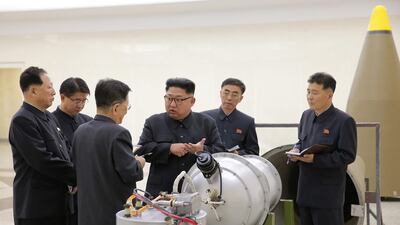North Korea conducted its sixth and most powerful nuclear test on Sunday which it said was an advanced hydrogen bomb for a long-range missile, marking a dramatic escalation of the regime's stand-off with the United States and its allies.
The test drew swift international condemnation, including from US president Donald Trump, who described North Korea as a "rogue nation" and said its actions "continue to be very hostile and dangerous to the United States".
"Appeasement with North Korea will not work, they only understand one thing," he said on Twitter.
The White House said Mr Trump's national security team was "monitoring this closely" and the president was to convene a meeting of his advisers later on Sunday. Mr Trump and his treasury secretary suggested that in addition to actions against North Korea, they would consider imposing sanctions on any country that conducted business with Pyongyang.
The nuclear test coincided with the opening day of the summit of Brics nations - Brazil, Russia, India, China and South Africa - being held in neighbouring China, North Korea's closest ally.
Chinese president Xi Jinping did not allude directly to the test but said in his opening speech that more than half a century of global peace was under threat from "incessant conflicts in some parts of the world and hotspot issues".
“The intertwined threats of terrorism and a lack of cybersecurity — among others — have cast a dark shadow over the world," he said.
Mr Xi and Russian president Vladimir Putin, who met at the summit, agreed to "appropriately deal" with the North Korean nuclear test, while the Chinese foreign ministry urged Pyongyang to stop its "wrong" actions.
North Korea, which carries out its nuclear and missile programmes in defiance of United Nations Security Council resolutions and sanctions, said the hydrogen bomb test ordered by leader Kim Jong-un had been a "perfect success".
The bomb was designed to be mounted on its newly developed intercontinental ballistic missile, it said.
The detonation registered with international seismic agencies as a man-made earthquake near a test site in the North. Japanese and South Korean officials said it was around 10 times more powerful than the tremor picked up after North Korea's last nuclear test a year ago.
There was no independent confirmation that the device tested was a hydrogen bomb, rather than a less powerful atomic device, but experts who studied the tremor caused by the explosion — measured by the US Geological Survey at magnitude 6.3 — said that there was evidence to suggest that North Korea had either developed a hydrogen bomb or was getting very close.
_____________________________________
Read more:
High noon in North Korea: Who’ll blink first?
North Korea hydrogen bomb claim: 'It's game over'
Seven intriguing stories about life in North Korea
_________________________________________
The test comes amid heightened regional tension following Pyongyang's two tests in July of intercontinental ballistic missiles that potentially could fly about 10,000 kilometres, putting many parts of the US mainland within range.
The US president has previously vowed to stop North Korea developing nuclear weapons and said he would unleash "fire and fury" on the regime if it threatened US territory.
The United States has repeatedly urged China to do more to rein in its neighbour, but Beijing has lambasted the West and its allies in recent weeks for suggesting that it is solely responsible for doing so. It has said military drills by South Korea and the United States on the Korean peninsula have done nothing to lessen tensions.
South Korean president Moon Jae-in said Seoul would push for strong steps to further isolate the North, including new UN sanctions. Japan also raised the prospect of further sanctions, saying curbs on North Korea's oil trade would be on the table.
Japanese prime minister Shinzo Abe slammed the test as "absolutely unacceptable" and said North Korea's nuclear and missile programmes now posed a more "grave and urgent" threat to his country.
"Whether we can stop North Korea's reckless actions that threaten world peace depends on the co-operation and solidarity of the international community," he added.
North Korea fired a ballistic missile directly over Japan on Tuesday, and Mr Trump had talked by phone with Mr Abe about the "escalating" nuclear crisis in the region just hours before Sunday's nuclear test.
Russia expressed "strongest condemnation" of Pyongyang's actions, and added it was "imperative to remain calm and to refrain from any actions that lead to a further escalation of tension".
The Russian foreign ministry said it regretted that the leadership of North Korea was "creating a serious threat" for the region and warned that "the continuation of such a line is fraught with serious consequences" for Pyongyang.
French president Emmanuel Macron also called for a "very firm" response by the international community and urged the UN Security Council to "quickly react".
EU foreign policy chief Federica Mogherini said she was looking forward to the Security Council "taking a firm and effective stand".
Nato secretary general Jens Stoltenberg condemned the test as "yet another flagrant violation" of multiple Security Council resolutions.
"Nato is concerned by Pyongyang's destabilising pattern of behaviour, which poses a threat to regional and international security," he said.

